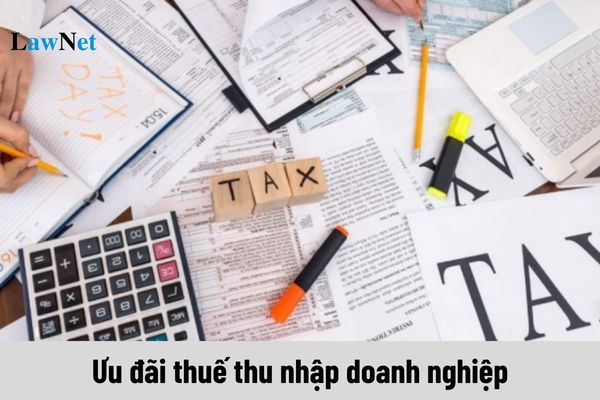Implementation of corporate income tax incentives for small and micro enterprises in Vietnam
What are regulations on implementation of corporate income tax incentives for small and micro enterprises in Vietnam?
According to point d, clause 1, Section 3, Article 1 Decision 508/QD-TTg 2022, the solution for implementing the strategic reform of corporate income tax policy as part of the tax system reform strategy until 2030 is as follows:
- Review to amend or abolish tax exemption and reduction incentives that are no longer appropriate to development requirements and international integration requirements;
- Minimize the integration of social policies with tax exemption and reduction policies, ensuring tax neutrality for stable application in the mid and long term;
- Implement corporate income tax incentives for small and micro enterprises, while shifting the focus of foreign investment attraction policy from quantity to quality, encouraging the participation of economic sectors in investment in key industries and areas requiring investment encouragement;
- Expand the tax base in accordance with the socio-economic context of the country and international practices;
- Implement anti-transfer pricing standards and measures to combat base erosion in line with international practices.
Thus, the strategy for reforming corporate income tax policy until 2030 includes implementing corporate income tax incentives for small and micro enterprises.

Implementation of corporate income tax incentives for small and micro enterprises in Vietnam (Image from the Internet)
What is the current corporate income tax rate in Vietnam?
Based on Article 10 Corporate Income Tax Law 2008 (amended and supplemented by clause 6, Article 1 Amended Corporate Income Tax Law 2013), the corporate income tax rates are prescribed as follows:
Tax Rate
- The corporate income tax rate is 22%, except for the cases specified in clause 2, clause 3 of this Article and entities eligible for preferential tax rates prescribed in Article 13 of this Law.
Those cases subject to the 22% tax rate as prescribed in this clause will switch to a 20% tax rate starting from January 1, 2016.
- Enterprises with total annual revenue not exceeding twenty billion dong shall apply a 20% tax rate.
The revenue used as the basis for determining enterprises eligible for the 20% tax rate under this clause is the revenue of the preceding year.
- The corporate income tax rate for activities of searching, exploring, and extracting oil, gas, and other precious resources in Vietnam ranges from 32% to 50% depending on each project and each business establishment.
The Government of Vietnam details and guides the implementation of this Article.
Thus, the current corporate income tax rate is 20%.
Except for the corporate income tax rate for activities of searching, exploring, and extracting oil, gas, and other precious resources in Vietnam, which will range from 32% to 50% depending on each project and each business establishment and entities eligible for preferential tax rates stipulated in Article 13 Corporate Income Tax Law 2008.
What income is exempt from corporate income tax in vietnam?
According to Article 4 Corporate Income Tax Law 2008 (amended and supplemented by clause 3, Article 1 Amended Corporate Income Tax Law 2013 and clause 2, Article 1 Law No. 71/2014/QH13 on the amendment of tax law 2014), tax-exempt income includes:
- Income from cultivation, husbandry, aquaculture, processing of agricultural products, seafood, salt production by cooperatives; income of cooperatives operating in agriculture, forestry, fishery, and salt production in areas with difficult socio-economic conditions or in areas with particularly difficult socio-economic conditions; income of enterprises from cultivation, husbandry, aquaculture, processing of agricultural products, seafood in areas with particularly difficult socio-economic conditions; income from marine fishing activities.
- Income from directly providing technical services supporting agriculture.
- Income from conducting scientific research and technology development contracts, products in the experimental production stage, and products from new technologies first applied in Vietnam.
- Income from the production and trading of goods and services of enterprises with at least 30% of the average number of employees in the year being disabled persons, rehabilitated addicts, persons infected with the human immunodeficiency virus (HIV/AIDS), and having an average number of employees in the year from twenty persons and above, not including enterprises operating in the fields of finance and real estate business.
- Income from vocational training activities exclusively for ethnic minorities, disabled persons, children under particularly difficult circumstances, and social evils subjects.
- Income allocated from capital contribution, joint ventures, and association activities with domestic enterprises, after paying corporate income tax in accordance with the provisions of the Corporate Income Tax Law 2008.
- Grants received for use in education, scientific research, culture, art, charity, humanitarian operations, and other social activities in Vietnam.
- Income from transferring certified emission reductions (CERs) of enterprises granted such certificates.
- Income from duties assigned by the State to the Vietnam Development Bank in investment credit activities, export credit; income from credit activities for the poor and other policy subjects of the Vietnam Bank for Social Policies; income of state financial funds and other state funds operating not for profit according to the law; income of organizations wholly owned by the State established by the Government of Vietnam to handle bad debts of Vietnamese credit institutions.
- Undistributed income of establishments conducting socialization in the fields of education - training, healthcare, and other socialized sectors for reinvestment in the development of such establishments in accordance with specialized laws on education - training, healthcare, and other socialized sectors; non-divisible income formed from assets of cooperatives established and operating under the provisions of the Cooperative Law 2023.
- Income from the transfer of technology in priority areas of transfer to organizations and individuals in areas with particularly difficult socio-economic conditions.

